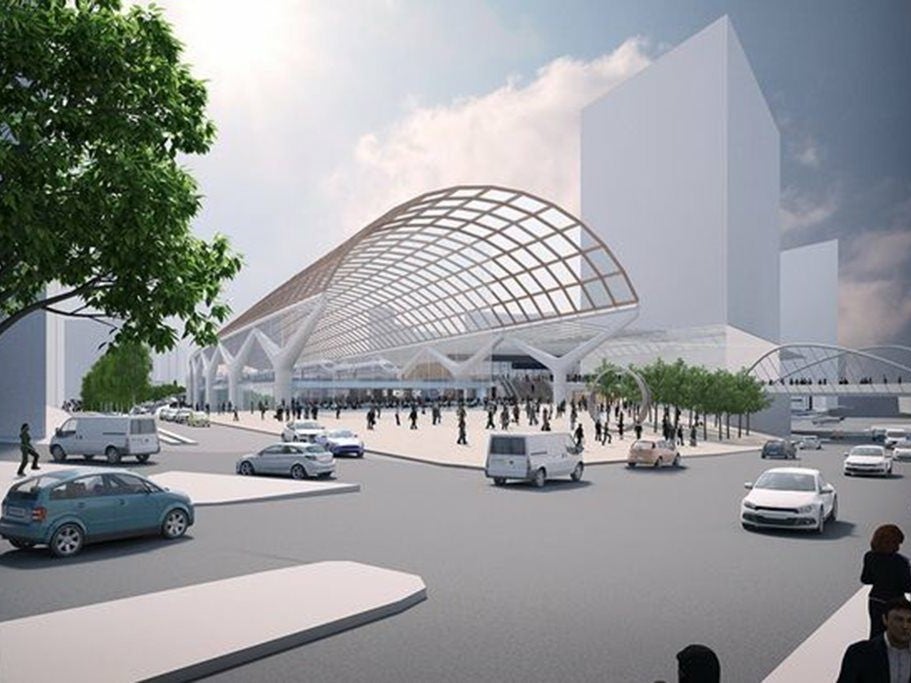HS2 station will cost Manchester 14,000 future jobs, says city leader as she calls for underground hub
Vast facility would eat up so much prime land it would hamper development opportunities for years to come, suggests Bev Craig

Your support helps us to tell the story
From reproductive rights to climate change to Big Tech, The Independent is on the ground when the story is developing. Whether it's investigating the financials of Elon Musk's pro-Trump PAC or producing our latest documentary, 'The A Word', which shines a light on the American women fighting for reproductive rights, we know how important it is to parse out the facts from the messaging.
At such a critical moment in US history, we need reporters on the ground. Your donation allows us to keep sending journalists to speak to both sides of the story.
The Independent is trusted by Americans across the entire political spectrum. And unlike many other quality news outlets, we choose not to lock Americans out of our reporting and analysis with paywalls. We believe quality journalism should be available to everyone, paid for by those who can afford it.
Your support makes all the difference.The proposed new HS2 station in Manchester will swallow so much prime land that it may hamper the region’s economic development for decades to come, the new leader of the city council has warned as she renewed calls for an underground hub instead.
Bev Craig said the proposed new facility – situated next door to Piccadilly – will be so vast it would take up space that would otherwise be developed to create 14,000 new jobs.
She said modelling also showed the station would be at full capacity from day one, meaning there would be no scope for increasing train numbers in the future and leading to bottlenecks.
Instead, she urged the government to reconsider an underground station which, she said, would also reduce the need for the vast viaducts currently planned to take high speed trains over the east of the city.
Speaking as the government prepares legislation which will pave the way for the construction of the project’s Crew to Manchester phase to begin, Councillor Craig - who replaced long-time council leader Richard Leese last month - said: “The overground plan is the wrong one.”
She added that internal analysis suggested the surface level facility would cut economic growth by £333 million by 2050 compared to an underground station.
“It will be cheaper to build in the short term but in the long term it will cost the region’s economy much more in missed opportunities,” she said. “It will also cause greater disruption while it is constructed and leave a legacy of unsightly viaducts and other overground infrastructure which limits our ability to create new homes or jobs.
“Restricting the potential of what will be one of the best-connected places in the country makes no sense at all.”
She added, however, that even an overgound station would ultimately be of benefit to the city.
Debate over how exactly HS2 should run into Manchester has gone on since the whole project was first proposed more than a decade ago with city leaders repeatedly backing a plan for an submerged station.
But they were left frustrated in November when the government’s Integrated Rail Plan confirmed the line would travel under much of South Manchester through a tunnel but would then surface as it came into the city centre in order to save money.
In a question to Grant Shapps at the time, Graham Stringer, the Labour MP for Manchester’s Blackley and Broughton constituency, told the transport secretary: “You would not have put Crossrail on stilts in Greater London.”
Andy Burnham, the Mayor of Greater Manchester, has also previously expressed concern that viaducts within the current plans – some of them 10 metres tall – would blight the Ardwick area of the city.
“It’s the sort of thing they build in China for brand new cities, but the difference is they are building on empty land,” he said in November. “East Manchester is home to long-established communities of thousands of people who would be underneath this line.”
A spokesperson for the Department for Transport said that an undeground station would cost up to £5 billion more and delay the opening of HS2 in the city.
They added: “Our analysis found that an underground station would cause major disruption during construction and take passengers longer to reach platforms, cancelling out the benefits of faster journeys...
“A surface station offers the best value for money and supports Greater Manchester’s ambitions to realise the benefits of high speed rail.”

Join our commenting forum
Join thought-provoking conversations, follow other Independent readers and see their replies
Comments